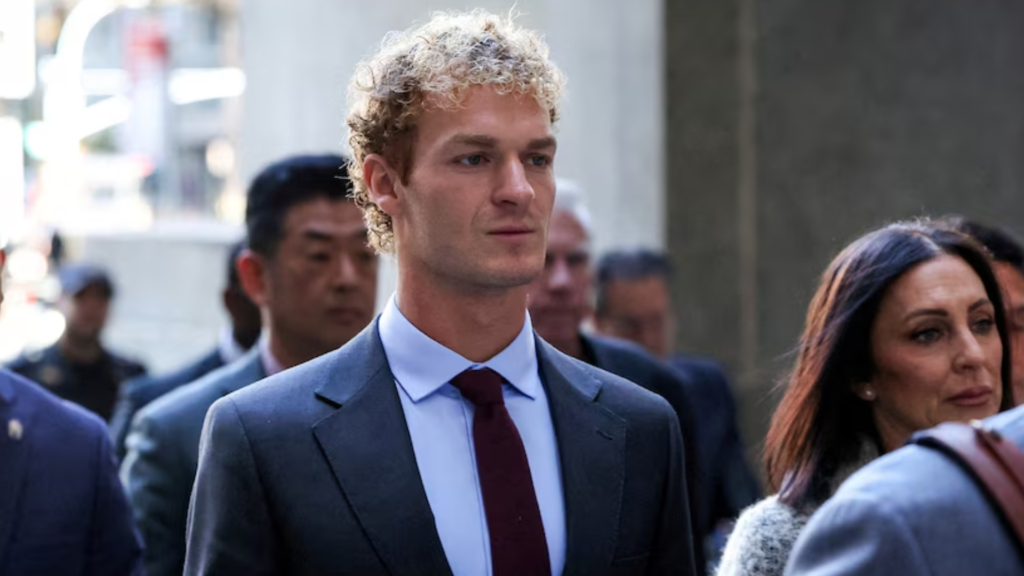
Daniel Penny, a 26-year-old Marine Corps veteran, was found not guilty of criminally negligent homicide in the subway chokehold case involving the death of Jordan Neely.
The verdict, reached after nearly a week of jury deliberations, also saw the dismissal of a second-degree manslaughter charge against Penny.
Jury entering!
— Inner City Press (@innercitypress) December 9, 2024
Clerk: How do you find on Daniel Penny on Count 2?
Foreperson: Not guilty.
From Penny said, applause
Judge: Be quiet.
From Neely side: … gonna be killed..
Judge: Out.
From Nelly side: It's a small world, buddy.. It's a racist country!
The courtroom was charged with emotion as the verdict was read on Monday morning. Applause reportedly erupted from Penny’s supporters, while members of Neely’s side expressed frustration, shouting, “It’s a small world, buddy,” and “It’s a racist country!”
Outside the courthouse, protestors voiced their discontent with chants such as “Daniel Penny, subway strangler,” and “If we don’t get no justice, they don’t get no peace.” Penny’s legal team had filed for a mistrial citing the disruptive protests, but the judge denied the motion.
The case stemmed from a May 2023 incident on an uptown F train in New York City. Neely, a homeless man with a history of mental illness, began behaving erratically and allegedly threatened passengers.
Penny, along with others, restrained Neely, with Penny placing him in a chokehold. Neely was later pronounced dead at the hospital, with his death ruled a homicide caused by neck compression.
Penny was initially charged with second-degree manslaughter and criminally negligent homicide. The manslaughter charge was dismissed after the jury declared themselves deadlocked on the count.
Judge Maxwell Wiley directed them to continue deliberations after their first note but agreed to dismiss the charge following a second note on Friday at the prosecution’s request.
Throughout the trial, Penny’s defense portrayed him as a hero who acted to protect fellow passengers. During closing arguments, defense attorney Steven Raiser asked jurors to place themselves in the shoes of those on the train that day. “You’re sitting much as you are now, in this tightly confined space. You have very little room to move and none to run,” Raiser said, describing Neely as “filled with rage and not afraid of any consequences.”
“Danny acted to save those people,” Raiser argued, emphasizing that Penny could not have foreseen Neely’s death. “He is not guilty,” he concluded.
In contrast, Manhattan prosecutor Dafna Yoran characterized Penny’s actions as reckless and dehumanizing. Yoran accused Penny of failing to see Neely as a person and argued that he viewed him as someone to be eliminated.
“He was so reckless with Neely’s life because he didn’t seem to recognize his humanity,” Yoran said, replaying video of Penny’s police interrogation where he referred to Neely as a “crackhead” and suggested he was like others who “push people in front of trains.”
Yoran’s argument aimed to highlight a lack of remorse on Penny’s part, asking jurors to consider the context of Penny’s statements knowing that Neely had died. “Can you imagine a reasonable person speaking like this about a human being that he or she had just killed?” she asked.
The trial featured testimony from multiple witnesses who were on the train that day. Eighteen-year-old Moriela Sanchez, who called 911 during the incident, described Neely as attacking passengers.
“He’s trying to attack everybody,” she told dispatchers. Sanchez testified in court that Penny subdued Neely to prevent him from harming others.
Another witness, Ivette Rosario, corroborated Sanchez’s fear, testifying that she was scared of Neely’s behavior. Caedryn Schrunk, another passenger, recounted Neely’s aggressive demeanor, describing his rant as “satanic” and recalling that he shouted, “I don’t care if I die. Kill me, lock me up.”
However, questions arose regarding the nature of the chokehold Penny used. Joseph Caballer, a former Marine sergeant who served with Penny, initially suggested Penny applied a “blood choke” targeting the carotid artery but later conceded it might have been an “air choke,” which compresses the airway.
Defense expert Dr. Satish Chundru testified that Neely’s death was likely caused by a combination of factors, including synthetic drug use (K2), his sickle cell genetic disorder, psychosis, and physical exertion during the struggle.
Body camera footage from New York Police Department officers showed that Neely still had a pulse when first responders arrived. However, officers testified they were hesitant to perform mouth-to-mouth resuscitation due to concerns about contracting hepatitis, as Neely was a known drug user.
After intense deliberations, the jury cleared Penny of all charges. His defense team maintained that Penny acted responsibly in a volatile situation and sought to protect others.
The dismissal of the manslaughter charge marked a significant turning point in the case, underscoring the complexities surrounding self-defense and public safety in New York City’s transit system.
The case has sparked national debate about mental health, homelessness, and the responsibilities of bystanders in moments of crisis. While Penny’s acquittal brought relief to his supporters, it left Neely’s advocates calling for systemic change and accountability.
As the dust settles, the verdict leaves lingering questions about justice, race, and the role of personal responsibility in highly charged incidents like this one.

